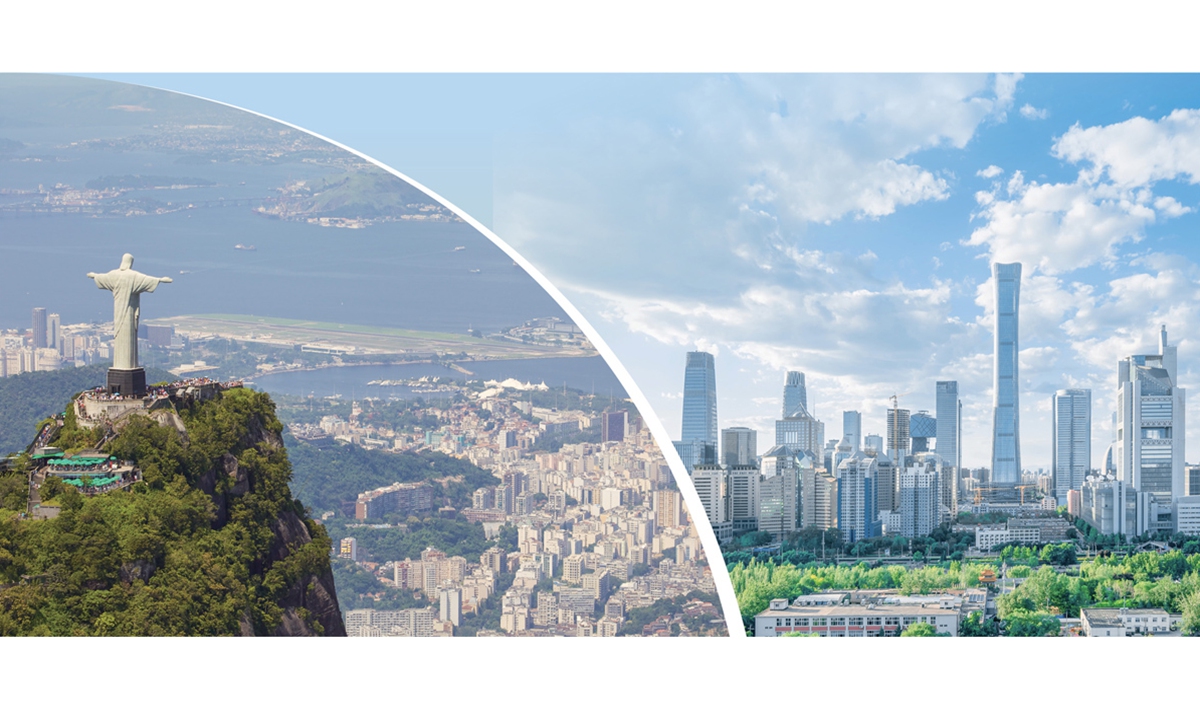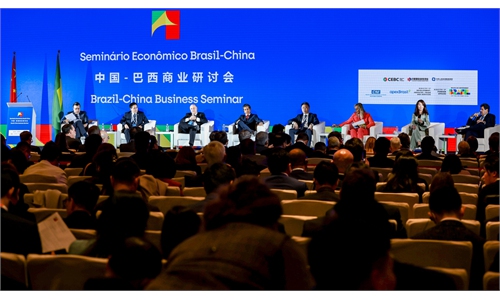China’s wisdom in modernization and democracy can be drawn by Brazil: Brazilian scholar

Rio de Janeiro and Beijing. Photos: VCG
Editor's Note:Brazilian President Luiz Inacio Lula da Silva is scheduled to pay a state visit to China from April 11 to 14, the presidential press office announced on March 31. China and Brazil are both major developing countries and important emerging market economies, and the two countries have been promoting comprehensive strategic partnership. What will be the biggest highlight of this visit? How can the two countries jointly uphold multilateralism and address rising global risks? Evandro Menezes de Carvalho (Carvalho), director of the Center for Chinese Studies at the Brazilian college Getulio Vargas Foundation, shared his views on these issues as well as his understanding of Chinese-style modernization and democracy with Global Times (GT) reporter Wang Zixuan.
GT: What do you think is the biggest highlight of this visit? What has been the most prominent impact on China-Brazil relations since President Lula took office?
Carvalho: First of all, I think this visit sends a strong message that President Lula is interested in developing presidential diplomacy. He's trying to start a new moment in bilateral relations, especially after the Jair Bolsonaro government. The former Brazilian president didn't make so much effort to establish good relations with China, especially at the presidential level. So I think this is the first message Lula intends to show that the Brazilian president is totally open to talk and also wants to talk with China.
GT: China and Brazil have supported each other in multilateral mechanisms such as BRICS, G20 and WTO. How do you think the two countries can jointly uphold multilateralism in the current complex situation worldwide? What is the role of the Global South in upholding multilateralism?
Carvalho: I think President Lula will try to renew the Brazilian commitment with these multilateral platforms and international organizations. During Lula's [previous] government, Brazil, together with China, Russia and India, decided to set up the BRIC platform in 2008. At that time, the world was facing an economic crisis, and they also decided to strengthen the G20 in order to promote the reform of the international organizations and international order.
Now we are facing a huge crisis of multilateralism. We know that President Lula is totally engaged in the agenda to support the reform of international organizations, multilateralism and a peaceful solution to the problems of the world. In this way, President Lula and President Xi have the same targets, they can develop a good cooperation in order to bring this agenda back to the stage.
Actually, there are different reasons compared to 2008 when the reform of the international organizations was supported by China and Brazil because of economic reasons. Now, both countries will probably support the reform of international organizations or the strength of multilateralism because of political reasons, given the situation of Ukraine and the behavior of the US in the international arena. It's time to discuss the international order and promote multilateralism in order to avoid more political conflicts. I think President Lula and President Xi have the same objective in this area.
GT: China and Brazil are both major developing countries and important emerging market economies, they have also established comprehensive strategic partnership. Apart from economic and trade relations, in what other fields can China and Brazil boost cooperation to address rising global risks and challenges?
Carvalho: Apart from economic relations, the second one is that at the political level, we can work together to find a solution in the Ukraine war. In this way, we can also be more active together in the initiatives that can build a more stable and peaceful world. When it comes to bilateral relations, we can improve people-to-people exchanges to let people from both countries know each order better. Besides, we can establish cooperation in technology, communications and education. All of this is important to the reciprocal knowledge about each other.
In the West, there are a lot of misunderstandings, misinformation or fake news about China, especially because of the US, so Brazil could make an effort to avoid this lack of understanding about China.
GT: You have a deep and unique understanding of the China-proposed Belt and Road Initiative (BRI), and Chinese modernization has become a catchphrase after the 20th National Congress of the Communist Party of China. Do you think the path of China's modernization can provide some experience for Brazil and other developing countries?
Carvalho: China offers the world a lot of Chinese wisdom and philosophy, the Chinese modernization, to a certain extent, reflects their way of economic development. We need to learn all the Chinese experience and Chinese philosophy to better understand the country in this century. China has developed several concepts, including the community with a shared future for mankind, the Global Civilization Initiative and the BRI.
Unfortunately, Brazil doesn't yet fully understand the meaning of the BRI. It is not only a concept, but an initiative that promotes the trade among the involved countries and the people-to-people exchanges, which is a new kind of economic integration proposed by China.
This economic integration is different from the EU model and the US model, as the US is a free trade zone while the EU is a common market above the constitutional level. The BRI is different because it's based on infrastructure. This is something concrete, and Brazil needs to improve its infrastructure, China could be our partner in this way.
In 2014, the Chinese government pledged $40 billion to set up a Silk Road Fund. In 2017, China announced to put an additional 100 billion yuan (about $14.5 billion) to this fund. Considering that China has been the largest trading partner of Brazil since 2009, I don't understand why Brazil resists participation in the BRI.
GT: What do you think is the biggest difference between China's democracy and Western democracy? Is American democracy still the role model as it claims to be?
Carvalho: I don't believe that the US democracy is a model. A lot of democracies in the world face a crisis of legitimacy. The people are not content with the political process. Once the politicians are elected, they make decisions that the people have no participation in, sometimes the decisions are even against the will of the people, or damage the society. This is the reason why a lot of democracies are not true democracies where people can effectively exercise the power. And their economic power and political power are controlled by small groups of people. In Brazil, for example, five people have the wealth equivalent to the money that half of the Brazilian population owns. This is a dysfunctional democracy. The people are called just to vote in each and every four years. Then they have to accept all kinds of decisions and have to shut up. Their quality of life has worsened.
When we look into China, the fact is, the idea that the West is trying to send to the world about the Chinese political system is wrong. Because the Chinese political system is very complex, and the Chinese government is creating more and more channels through which the population can participate in or express their suggestions. The Chinese government also takes advantage of technology to give the people the opportunity to express their opinions on some policies.
The second is that China has a Political Consultative Conference, the National People's Congress and the People's Congresses at different levels, it's a kind of consultative democracy. China also has the regional autonomous system, which creates a different kind of governance with specificity. There are committees in the villages, all these committees can choose their leaders directly. It' s a direct vote and it works.
China released a white paper entitled "China: Democracy That Works" where China discusses about this concept. According to this document, I think China is right when it says democracy is not only a procedural democracy where the people only have the right to vote, but must be a substantive democracy where the people have the right to participate in the decision-making process or have the opportunity to give their suggestions so that the government can improve the administration. In this way, what China is saying to the world is, China has its own democracy and its democracy is socialist democracy.
GT: President Lula has proposed a "peace club" to negotiate the end of the Ukraine conflict. The Global South and the West have different positions on the Ukraine war, what kind of trends are shown in this divergence? China has also put forward China's Position on the Political Settlement of the Ukraine Crisis, how do you understand China's role on this issue?
Carvalho: I think President Lula expresses his opinion in favor of this. According to our constitution, Brazil must act in international relations under the principle of no intervention. On the other side, President Lula didn't agree to send guns or whatever to support the Ukraine fight against Russia.
German Chancellor Olaf Scholz asked President Lula to send military support to Ukraine, and Lula said no to try to establish a kind of balance, it sends a message to both sides that Lula and Brazil take no side. The side of Brazil is in favor of peace. I think President Lula will try to discuss the agenda with President Xi.
It's important that Lula has this opinion, because the world needs such words for peace. But Brazil is not a key actor here. If Russia and Ukraine decide or agree to sign a treaty, it's not because of Brazil, it's because of China, the US and some countries in the EU, they are the key actors in this process. But it's good that China proposed the peace plan, which may provide a solution to the conflict.


